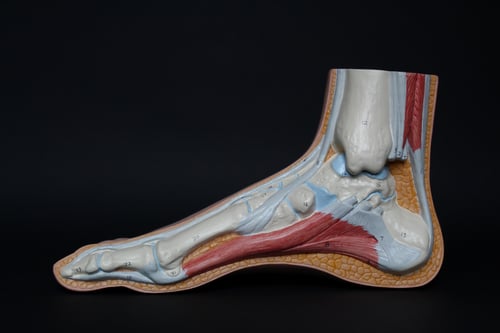Demystifying Foot Tendonitis: Symptoms, Causes and Treatments

Have you been experiencing pain in your foot that gets worse when trying to walk? Does the pain in your foot feel as though it is moving up and down your leg? Are you experiencing achiness, burning, and swelling in the foot and ankle region? Do you find the pain and discomfort keeping you from being able to enjoy or complete your regular exercise routine?
If you answered “yes” to one or more of these questions, you likely developed foot tendonitis. Tendonitis is the inflammation or irritation of tendons in your foot. Tendons are the strong bands of tissue that connect muscles to bones. They are able to act like rubber bands in that they can stretch and bounce back into shape.
Also, like rubber bands, if too much force is applied, they can stretch or tear. Read further to learn more about this condition, the process of its diagnosis, and options for treatment.
Symptoms of Foot Tendonitis
Symptoms can be different depending on which tendon in the foot you have injured, but usually include:
- Pain that gets worse with most physical activity.
- Swelling, redness, or warmth around the tendon.
- Bone spurs begin to form.
- Stiffness after longer periods of inactivity, such as getting out of bed in the morning or a long car ride.
- Thickening of the tendon.
- Discomfort and weakness along the length of the tendon or where it attaches to the bone.
How Did You Develop This Condition?
While just about anyone can develop foot tendonitis, it seems to favor athletes, highly active individuals, and people who spend a lot of time on their feet. People who overuse the tendons have a higher chance of developing tendonitis. This condition can also be a result of an injury.
Other common reasons you can develop tendonitis are being overweight, not stretching before and after physical activity, having flat feet, and having tight muscles and tendons in your legs. Research also suggests that nutrition can affect the likelihood and severity of foot tendonitis.
Diagnosing Foot Tendonitis
In most cases, your primary physician can review your symptoms and will likely perform a physical exam by pressing on certain parts of the foot to check for areas of tenderness and swelling. They will also assess the range of motion and strength as you perform various movements.
However, if you are frequently experiencing tendonitis or have had a sudden injury to a tendon, it may have caused it to fully rupture or break. Seek the attention of a foot specialist if you experience any of the following:
- You’re unable to put weight on your foot.
- You can’t move your foot in a particular position and direction.
- You’re experiencing severe pain.
- You experienced a popping or snapping sensation in your foot at the time of the injury.
How Is Foot Tendonitis Treated?
Luckily, there are many effective treatments to help you get relief from your symptoms and begin the healing process. Here are four of the best initial treatments for foot tendonitis:
- When you first begin to feel pain in your foot, the first recommendation is to follow RICE, which stands for rest, ice, compression, and elevation. In other words, you should do your best to refrain from any physical activities. The general idea is to rest the area so your body can heal the injury.
- Use anti-inflammatories that will help with pain and reduce any swelling.
- Use support like a bandage or brace to support the area. These can be found at your local supermarkets and drugstores.
- Your primary physician may recommend some specific stretches for you to perform at home or refer you to a physical therapist for more concentrated rehabilitation.
If you have been suffering from relentless tendonitis of the foot or have experienced an injury to the tendon, don’t wait to get seen by a foot specialist for an in-depth evaluation and care. Set up an appointment with Sweeney Foot & Ankle Specialists in Magnolia and The Woodlands, Texas. Our team can offer you options to begin the journey towards healing and returning to the active lifestyle you once enjoyed.






